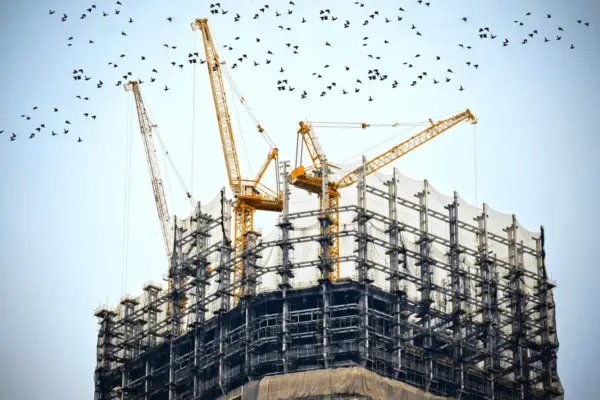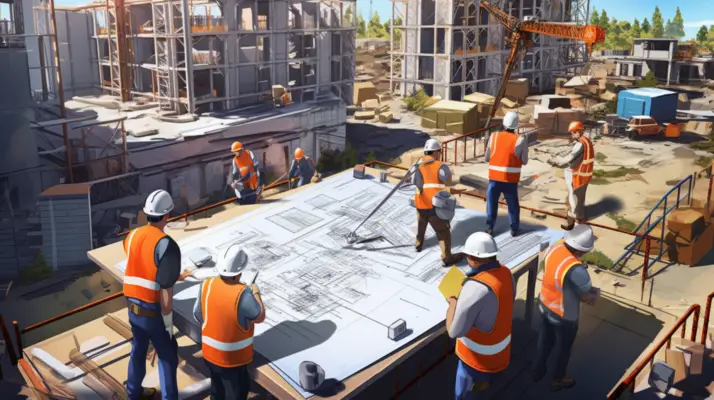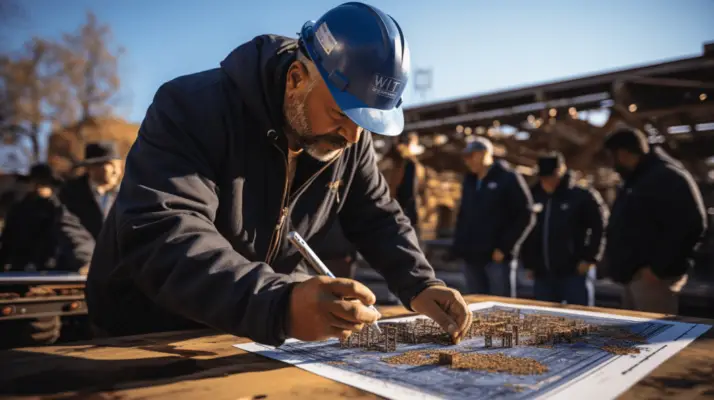The average salary for a Residential Construction Project Manager in the United States is $80,000 per year as of October 2023 (source: ZipRecruiter).
However, the salary range for this position is from $54,500 to $110,000 per year in the United States (source: Salary.com). According to Glassdoor, the average salary for a Project Manager in residential Construction is $87,986 per year in the United States.
The state with the most Residential Construction Project Manager jobs in the United States is California, where the average salary for this position is $84,000 per year as of June 2023 (source: Salary.com). Other states with a high number of Residential Construction Project Manager jobs include Florida, Texas, New York, and Georgia.
According to Indeed, there are currently over 9,000 job postings for Residential Construction Project Manager positions in the United States.
The median salary for a Residential Construction Project Manager is $79,000 per year, with a range between $56,000 and $109,000 per year (source: Payscale). Finally, ZipRecruiter reports that the average annual pay for a Residential Construction Project Manager in the United States is $80,000 per year as of October 2023.
Residential Construction Project Manager jobs require a combination of technical expertise, leadership skills, and excellent communication abilities.
These professionals are responsible for overseeing every aspect of a residential construction project, from the initial planning and budgeting stage to the final execution and completion of the project.
They work closely with architects, engineers, contractors, and subcontractors to ensure that the project is delivered on time, within budget, and in compliance with all building codes and regulations.
Additionally, they are responsible for managing the project schedule, coordinating resources, resolving any issues or conflicts that may arise, and ensuring the highest quality standards are met.
Residential construction project managers play a crucial role in the successful completion of residential construction projects.
These professionals oversee and manage all aspects of residential construction projects, ensuring they are completed on time, within budget, and according to quality standards.
From coordinating with subcontractors and suppliers to overseeing the construction process, their role is crucial in delivering successful residential projects.
This article explores the requirements, job description, and responsibilities of residential construction project managers, shedding light on this challenging yet rewarding career path.

What Does a Residential Construction Project Manager Do?
When considering the role of a residential construction project manager, it is important to understand the average salary and benefits associated with this position.
Examining the compensation package makes it clear that this job offers competitive pay and enticing perks.
Understanding the financial incentives can provide insight into the value placed on the responsibilities and skills required of a residential construction project manager.
Average Salary & Benefits
Residential construction project managers oversee and coordinate all aspects of construction projects, ensuring they are completed on time and within budget while managing the team and ensuring compliance with all relevant regulations and safety standards.
These professionals play a crucial role in the construction industry, utilizing their construction management skills, leadership abilities, and construction experience to execute projects successfully.
The average salary for a residential construction project manager varies depending on factors such as location, level of experience, and the size and complexity of the projects they handle.
According to the Bureau of Labor Statistics, the median annual wage for construction managers, which includes residential construction project managers, was $97,180 as of May 2020.
However, it is important to note that salaries can range widely, with experienced professionals and those specializing in high-end construction specialties earning significantly higher salaries.
Along with competitive salaries, residential construction project managers may also receive benefits such as health insurance, retirement plans, and bonuses based on project performance.
Requirements
To become a residential construction project manager, several key requirements must be considered.
These include the necessary education and experience in the construction industry and specific skills and qualifications that are important for success in this role.
Obtaining the appropriate licensing and certification may also be necessary to meet industry standards and regulations.
Education/Experience
Successful residential construction project manager candidates typically possess a solid educational background and extensive industry experience.
These qualifications are essential for effectively overseeing the construction process, managing construction operations, and ensuring the successful completion of residential construction projects.
A construction project manager must have a strong knowledge of construction management principles and practices. They should be familiar with the various stages of the construction phase, from pre-construction planning to project closeout.
Additionally, experience in using construction project management software can greatly enhance their ability to track progress, manage budgets, and communicate with stakeholders.
Moreover, a construction project manager should have a deep understanding of the construction industry, including the roles and responsibilities of construction workers, safety regulations, and quality control standards.
This knowledge and their educational background and experience enable them to lead and manage residential construction projects to successful outcomes effectively.
| Education | Experience | Skills |
|---|---|---|
| Bachelor’s degree in Construction Management or a related field | 5+ years of experience in residential construction project management | Knowledge of construction project management software |
| Strong knowledge of construction management principles and practices | Experience in overseeing the construction process from planning to closeout | Familiarity with construction operations and the roles of construction workers |
| Understanding of safety regulations and quality control standards | Excellent communication and leadership skills |
Skills & Qualifications
Candidates for residential construction project manager jobs must possess specific skills and qualifications. The construction industry requires individuals who can effectively manage projects, adhere to budgets, and coordinate with contractors and other stakeholders.
Strong communication skills are essential for effectively conveying project requirements to the team and maintaining open lines of communication with the employer.
Additionally, organizational skills are crucial for keeping track of project timelines, budgets, and resources.
Residential construction project managers must also prioritize safety and ensure that all necessary precautions are taken to protect workers and comply with regulations.
Previous experience as a residential construction superintendent is often preferred, as it demonstrates a deep understanding of the industry and the specific requirements of managing residential projects.
Licensing/Certification
Licensing and certification requirements are essential for residential construction project managers. These credentials ensure that project managers have the necessary knowledge and skills to oversee construction projects and comply with building codes.
While specific requirements may vary by state or employer, a combination of formal education, field experience, and certification is typically necessary to qualify for these positions.
One common certification option for residential construction project managers is a construction management certification program.
These programs provide comprehensive training in construction project management, including topics such as project planning, cost estimation, and risk management.
Additionally, relevant field experience is often required to demonstrate practical knowledge and skills in managing construction projects.
Here is an example of a table outlining the various licensing and certification requirements for residential construction project managers:
| Requirement | Description |
|---|---|
| Formal Education | Completion of a construction management program |
| Field Experience | Relevant experience with construction projects |
| Certification | Completion of a construction management certification program |
| Compliance with Building Codes | Understanding and adherence to applicable codes |
Job Description & Responsibilities
When it comes to the job description and responsibilities of a residential construction project manager, there are several key points to consider.
First and foremost, strong leadership skills are essential in order to effectively manage a team and ensure the successful completion of the project.
Additionally, the project manager must be proficient in scheduling and budgeting to keep the project on track and within financial constraints.
Furthermore, the manager must prioritize quality control and safety standards to guarantee that the construction meets the necessary standards.
Site supervision and management of workers are also crucial tasks, along with building relationships with clients and stakeholders to maintain effective communication and ensure their satisfaction.
Leadership Skills
Residential construction project managers regularly demonstrate strong leadership skills to oversee and effectively coordinate all aspects of a construction project.
As a residential construction project manager, you are responsible for ensuring that the construction project is completed on time and within budget. This includes managing the construction schedule, coordinating with the construction crew, and implementing construction methodologies that adhere to safety standards.
Your leadership skills motivate and guide your team to work together efficiently and effectively. You are also responsible for managing project budgets and ensuring that resources are allocated appropriately.
Your ability to lead and inspire your team is essential for the timely completion of a wide range of construction projects.

Scheduling & Budgeting
Managing the scheduling and budgeting aspects of residential construction projects is a critical responsibility for project managers in this field.
As a construction project manager, you oversee the entire project management process, from initial planning to project completion.
This includes creating a comprehensive project plan that outlines the timeline, tasks, and resources required for successful completion.
Budgeting is crucial to this process, as you will be responsible for allocating funds and ensuring cost control throughout the project.
Effective scheduling is also essential, as it ensures that tasks are completed in a timely manner and that the construction team stays on track.
Quality Control & Safety Standards
As part of their job description and responsibilities, project managers in residential construction are responsible for ensuring quality control and adherence to safety standards throughout the project.
They must oversee all aspects of quality control, including inspecting materials, verifying compliance with safety regulations, and implementing corrective actions when necessary.
Project managers work closely with field personnel to ensure that all workers are trained in safety protocols and follow them diligently.
They are also responsible for developing and implementing a site-specific safety plan, which includes identifying hazards, establishing safety procedures, and conducting regular safety inspections.
Additionally, project managers must ensure that all trade contractors and vendors comply with safety regulations and guidelines. Effective vendor management is crucial to maintain a safe and productive work environment.
Site Supervision & Management of Workers
The site supervision and management of workers is a critical aspect of the job responsibilities of residential construction project managers.
These professionals are responsible for overseeing the construction activities on job sites, ensuring that projects are completed efficiently and according to specifications.
They work closely with their project team to coordinate and schedule the work of contractors and subcontractors, ensuring that all tasks are completed on time and within budget.
Residential construction project managers must have strong technical skills and knowledge of construction processes and materials. They also need to be familiar with occupational safety and health administration regulations to ensure a safe working environment.
Additionally, they are responsible for maintaining relationships with clients and ensuring the successful completion of residential development projects.
| RESPONSIBILITY | DESCRIPTION |
|---|---|
| Overseeing construction activities | Ensure projects are completed efficiently and according to specifications |
| Coordinating and scheduling work | Coordinate and schedule the work of contractors and subcontractors |
| Technical skills | Strong technical skills and knowledge of construction processes and materials |
| Occupational safety and health administration | Familiarity with OSHA regulations to ensure a safe working environment |
| Maintaining relationships with clients | Maintain relationships with clients and ensure successful completion of projects |
Relationship Building with Clients and Stakeholders
Building strong relationships with clients and stakeholders is a crucial responsibility for residential construction project managers. In residential construction project manager jobs, relationship building plays a vital role in ensuring successful project outcomes.
As a construction project manager, having excellent interpersonal and communication skills is essential in establishing trust and rapport with clients and stakeholders.
This includes understanding their needs and expectations, effectively managing their concerns and feedback, and providing regular updates on project progress.
Communication with Subcontractors, Architects, Engineers, etc.
Effective communication with subcontractors, architects, engineers, and other stakeholders is fundamental to the residential construction project manager’s job.
It ensures that everyone involved in the project is on the same page, reduces misunderstandings, and keeps the project moving smoothly.
Strong communication skills are essential for the project manager to effectively convey project requirements, timelines, and expectations to subcontractors, architects, and engineers.
This includes providing clear instructions, addressing any concerns or issues that arise, and coordinating schedules and resources.
Additionally, the project manager must maintain a strong network of contractors and vendors, ensuring that all necessary contracts are in place and that materials and services are delivered on time.
Effective communication is especially important when working with high-end clients with specific demands and expectations.
Successful communication with all stakeholders is crucial for the timely and successful completion of residential construction projects.
Problem Solving in Response to Unexpected Issues or Delays
Problem-solving is a critical aspect of a residential construction project manager’s job, particularly when it comes to addressing unexpected issues or delays.
As a residential project manager, you are responsible for overseeing the entire construction process, from design and development to the project’s final completion. This includes managing both residential and commercial construction projects.
When unexpected issues or delays arise, it is your role to identify the problem, analyze the situation, and find effective solutions to keep the project on track. This requires strong problem-solving skills, thinking critically, and making quick decisions.
As a construction project manager, you must be adaptable and resourceful in order to navigate through any challenges that may arise during the course of your work.
Making Regular Reports on the Progress of Projects
As a residential construction project manager, part of your job entails providing regular reports on the progress of projects and ensuring effective communication and coordination throughout the construction process.
This crucial responsibility allows stakeholders to stay informed and make strategic decisions based on the project’s status.
These reports serve as a means of tracking milestones, identifying potential risks, and addressing any issues promptly.
They also provide a platform for celebrating achievements and recognizing the project team’s hard work. Ultimately, your reports play a pivotal role in keeping all parties involved informed and engaged, leading to successful residential construction projects.
Frequently Asked Questions
What Is the Average Salary Range for Residential Construction Project Managers?
The average salary range for residential construction project managers varies depending on factors such as location, experience, and company size.
However, it typically falls between $60,000 and $100,000 per year.
What Are the Typical Working Hours for a Residential Construction Project Manager?
The typical working hours for a residential construction project manager can vary depending on the specific project and company policies.
However, they often work full-time hours, which can include evenings and weekends, to meet project deadlines.
Are There Any Certifications or Licenses Required to Work as a Residential Construction Project Manager?
To work as a residential construction project manager, there are certain certifications and licenses that may be required.
These credentials demonstrate a level of expertise and knowledge in the field, ensuring a higher standard of professionalism and quality in the industry.
What Are the Common Challenges Faced by Residential Construction Project Managers?
Common challenges faced by residential construction project managers include managing tight budgets, coordinating multiple subcontractors, ensuring adherence to building codes and regulations, dealing with unexpected delays or issues, and maintaining effective communication with clients and stakeholders.
Is It Common for Residential Construction Project Managers to Work on Multiple Projects Simultaneously?
It is common for residential construction project managers to work on multiple projects simultaneously. This can be challenging as completing all projects successfully requires effective time management, coordination, and communication skills.

Conclusion
Residential construction project managers play a crucial role in overseeing and coordinating the various aspects of residential construction projects.
They are responsible for ensuring that projects are completed on time, within budget, and according to quality standards.
With their expertise in project management, communication, and problem-solving skills, they contribute to the successful completion of residential construction projects.

Chris Ekai is a Risk Management expert with over 10 years of experience in the field. He has a Master’s(MSc) degree in Risk Management from University of Portsmouth and is a CPA and Finance professional. He currently works as a Content Manager at Risk Publishing, writing about Enterprise Risk Management, Business Continuity Management and Project Management.

